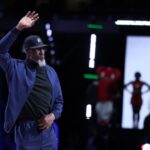
The Detroit Pistons have finally started earning positive attention this season with their 7-9 start. Offseason moves, such as acquiring Malik Beasley and Tobias Harris, have reinvigorated the roster as they march toward a potential postseason berth. It’s a welcome change for a franchise that has faced harsh scrutiny in recent years, from a 28-game losing streak to off-court controversies involving players.
This isn’t the first time the Pistons have been at the center of intense media narratives. Rewind to the 2004-05 season: fresh off a championship win over the Los Angeles Lakers, the Pistons were favorites to repeat but began the season slowly at 4-3. Their November 19 game against the Indiana Pacers would become a defining moment—not just for their season but for the entire league.
The Malice at the Palace profoundly impacted both teams and reshaped the NBA’s future. How did this event change the relationship between players and fans? The aftermath led to severe penalties and sweeping changes in arena security and alcohol policies. Twenty years later, its effects still shape the game, influencing player behavior and league regulations.
Malice at the Palace: Revisiting The NBA’s Darkest Night
What Caused The Malice At The Palace
With 45.9 seconds left on the clock, Ron Artest committed a hard foul on Ben Wallace—a foul emblematic of the physicality between these defensive powerhouses. Given the Pacers’ 15-point lead, Wallace deemed the foul excessive and retaliated by shoving Artest, sparking a confrontation that brought both teams together near the sideline.
Rather than escalating the altercation, Artest took an unusual approach—lying on the announcer’s table to avoid further conflict. This act, however, only provoked Wallace further, leading him to throw his wristband at Artest. Just as tensions seemed to settle, a pivotal moment reignited the chaos. John Green, a fan in the stands, threw a cup of beer that struck Artest. The provocation sent Artest charging into the stands, where he mistakenly grabbed the wrong fan while others pelted him with drinks.
Seeing Artest under fire, Stephen Jackson joined him in the stands and punched another fan, William Paulson. Meanwhile, on the court, the chaos intensified as fans Alvin Shackleford and Charlie Haddad charged the floor. Jermaine O’Neal, in one of the most memorable moments, slipped while attempting a running punch at Haddad, narrowly avoiding a devastating blow.
The Aftermath
When the dust settled, Pistons fans bore much of the blame. Once regarded as some of the NBA’s best supporters, Pistons fans saw their reputation tarnished as the league and media condemned their role in the incident.
The Pacers, meanwhile, faced internal tensions. O’Neal nearly clashed with head coach Rick Carlisle, accusing the coaching staff of restraining players who were trying to defend themselves. In a surreal moment amidst the chaos, Artest turned to Jackson and asked, “Jack, you think we’re going to get in trouble?” Jackson’s incredulous reply summed up the situation: “Are you serious, bro? Trouble? Ron, we’ll be lucky if we still have a freaking job!”
The situation intensified when Auburn Hills police entered the Pacers’ locker room to arrest Artest. However, the team quickly intervened, escorting him onto the bus to avoid further conflict. The police chose to prioritize the Pacers’ departure, delaying criminal charges until after reviewing footage of the incident. By the time the Pacers’ bus left, dozens of police cruisers had gathered in the parking lot and along the nearby road.
The Penalties
The following day, NBA Commissioner David Stern delivered some of the harshest penalties in league history:
- Ron Artest: Suspended for the remainder of the season (86 games: 73 regular-season, 13 playoff)
- Stephen Jackson: 30 games
- Jermaine O’Neal: 25 games (reduced to 15)
- Ben Wallace: Six games
- Anthony Johnson: Five games
- Reggie Miller: One game
- Chauncey Billups: One game
- Derrick Coleman: One game
- Elden Campbell: One game
Five Pacers players and five Pistons fans were charged with varying levels of assault or battery following the Malice at the Palace. O’Neal and Green were charged with two counts. Artest, David Harrison, Jackson, and Johnson were charged with one count each, while Bryant Jackson faced felony assault for throwing a chair. Shackleford and Haddad were charged with trespassing.
In 2005, Bryant Jackson pleaded no contest to felony assault, receiving probation and restitution. David Wallace (Wallace’s brother) was convicted and sentenced to probation and community service for punching Fred Jones. The players all received probation, community service, fines, and anger management counseling. Green was convicted in 2006, sentenced to jail and probation, and banned from Pistons home games.
In addition to these suspensions and criminal charges, the incident catalyzed sweeping changes to NBA security policies. On February 17, 2005, the league implemented stricter measures:
- Alcohol purchases were capped at 24 oz (710 ml) per transaction.
- Fans were limited to two alcoholic beverages per purchase.
- Alcohol sales ended after the third quarter.
- Each team was required to place at least three security guards between players and fans.
These changes marked a turning point as the NBA sought to protect its players, fans, and public image.
The Last Word
The Malice at the Palace remains one of sports’ most infamous moments, turning a routine foul into a chaotic brawl with lasting consequences. For the Pacers, it derailed a championship-contending season; for the Pistons, it stained the reputation of their passionate fanbase.
The incident forced the NBA to prioritize safety, introducing stricter security and alcohol regulations to prevent future clashes. Two decades later, it stands as a cautionary tale, a pivotal moment that reshaped the relationship between players, fans, and the league. Its lessons continue to influence the NBA today.
The post Malice at the Palace: Revisiting The NBA’s Darkest Night appeared first on Last Word On Basketball.